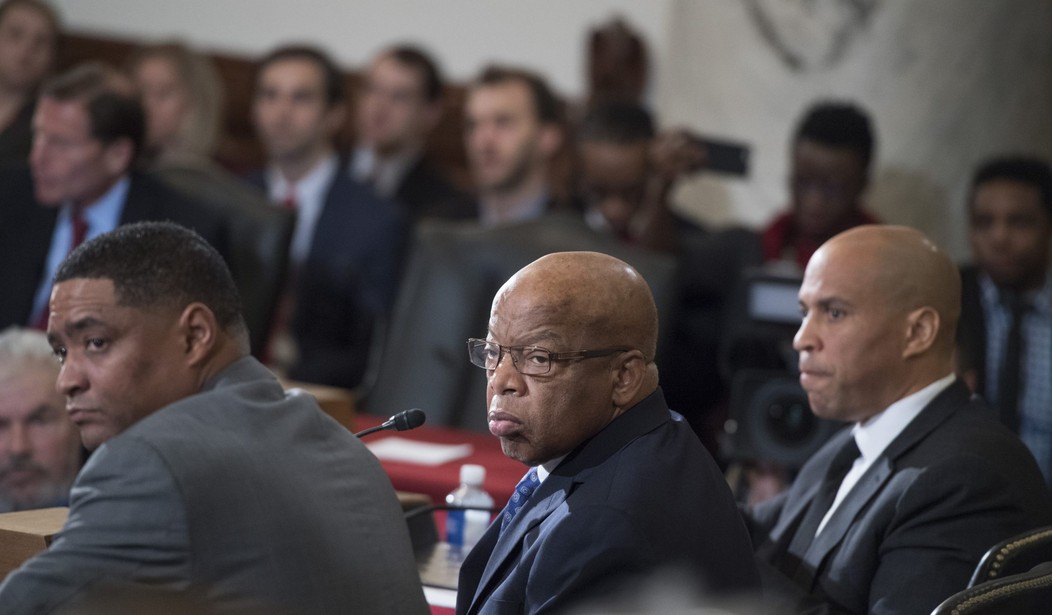WASHINGTON — Rep. John Lewis (D-Ga.) argued today that repealing rules prohibiting nonprofit organizations, including religious institutions, from engaging in political activity “would pit neighbor against neighbor, worshipper against worshipper, and volunteer against volunteer.”
“It will literally wreak havoc on the last pillars of civility in our country,” Lewis said during a House Ways and Means Committee mark-up of the Republican tax reform bill.
The Johnson Amendment, a tax code provision dating back to 1954, states that 501(c)(3) exempt organizations do “not participate in, or intervene in (including the publishing or distributing of statements), any political campaign on behalf of (or in opposition to) any candidate for public office.” At the National Prayer Breakfast in February, Trump, who received more than 80 percent of the white evangelical vote, vowed to “totally destroy” the rule.
In May, President Trump issued an executive order that didn’t repeal the Johnson Amendment but instructed the Treasury Department that “churches should not be found guilty of implied endorsements where secular organizations would not be.”
“Among many historic steps, the executive order followed through on one of my most important campaign promises to so many of you: to prevent the horrendous Johnson Amendment from interfering with your First Amendment rights,” Trump told the Family Research Council’s Values Voter Summit in D.C. last month. “We will not allow government workers to censor sermons or target our pastors or our ministers or rabbis. These are the people we want to hear from, and they’re not going to be silenced any longer.”
The tax reform bill introduced by House Republican leaders last week repeals the Johnson Amendment. “I don’t want the IRS looming over our faith leaders in the community as they express their religious freedom,” Ways and Means Committee Chairman Kevin Brady (R-Texas) said. “We don’t need to protect government from our faith leaders. We need to protect faith leaders from government.”
Lewis, along with Democratic Reps. Ron Kind (Wis.), Judy Chu (Calif.), Suzan K. DelBene (Wash.), Lloyd Doggett (Texas), Brian Higgins (N.Y.), Danny K. Davis (Ill.), and Earl Blumenauer (Ore.), pushed an amendment during the committee hearing to restore the Johnson Amendment — saving $2.1 billion, they noted, as estimated by the Joint Committee on Taxation.
“When faith leaders and charitable organizations began expressing concerns to me earlier this year, I thought they were overreacting. It was too crazy too unbelievable for this idea to be even possible, but when I reached the end of this bill, I was shocked and appalled,” Lewis said of the repeal language in the tax bill.
Explaining his belief that repeal would pit church members against each other, Lewis noted that “during the Civil Rights Movement, we fought to tear down pillars of hate and discrimination — we spent hours in churches, temples, and synagogues organizing, training, studying, because where faith leaders had the moral authority to stand against immoral laws and guide us against indefensible policies.”
“Our movement was never about a party or a candidate,” he added. “We came together because of our shared values, our hopes, and our dreams for our families, communities, country, and world. People of all races, all religions, and all walks of life were united by a moral purpose for a shared purpose and mission.”
Lewis reflected on an effort to repeal the Johnson Amendment 15 years ago, which failed in a GOP-controlled Congress.
“Democrats and Republicans came together to preserve the last remaining sanctuaries from partisan politics. In our heart of hearts, we understood that we had a responsibility to put the good of our nation before campaigns. My friends, we need that vision and unity again today. Help us save us from what we might do today,” Lewis said. “Now I have spent my entire lifetime, not as a lay person, but as ordained and licensed minister. I know that there is a separation between church and state.”









Join the conversation as a VIP Member